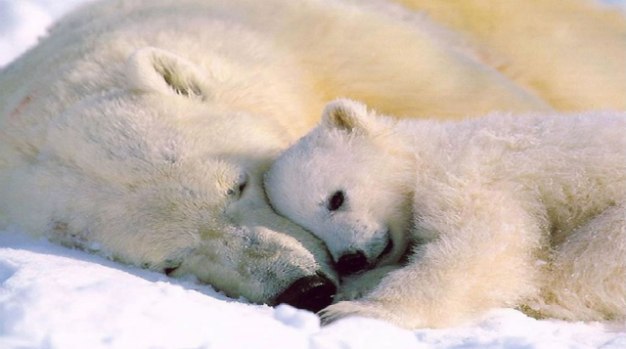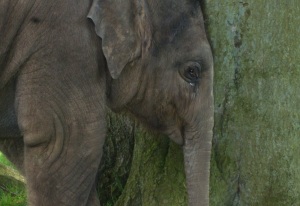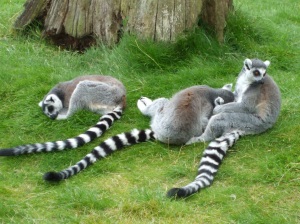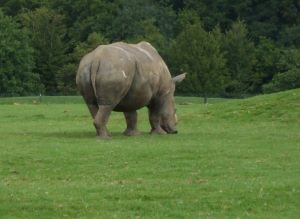Image: http://www.lovethesepics.com
He wasn’t feeling too good so I carried his breakfast through into the lounge where he was watching TV and sat down with him on the sofa for five minutes. He was watching a wildlife programme and, as the small polar bear weakened and failed through starvation, I watched through a veil of tears. My own son beside me, it was easy to recognise the encouragement in the way the ursine mother tried to raise her cub to his feet. That was bad enough. Realising the little one could no longer stand she and his twin snuggled up with the dying cub, sharing warmth and comfort; nuzzling him gently and curled around the little body. Just waiting until the end. I can’t even write it without tears.
There was the debate about how the camera crew could simply stand by and watch, filming the tragedy, but the general policy is that they do not interfere, only observe the natural unfolding of life and death in the wild. To have provided food, had any been available out there in the snowy wastes, would have inevitably meant the taking of one life to sustain another, and while it might be argued that some species face less of a threat of extinction than others, Nature has her ways and it might only have been a postponement rather than a salvation if the young cub was weak.
I do not, for one minute, think that the cameraman watched without an ache in his heart, having followed and filmed the bears for so long. You could feel the human emotion in the delicacy of his touch as he filmed those final moments, capturing the body language of maternal grief that seems to carry universal understanding. It was so gently done that it is one of those sequences I shall not forget.
The next sequence of the film showed a seal pup washed away from the herd in a storm and the determination with which its mother and aunt searched for her…. And the very obvious joy and welcome all round when they found her. Sequences like these highlight how closely the threads of life are bound together and could teach us of our similarities with other species, rather than our differences.
It is very easy to say that we project human emotions onto animals and believe them to feel in the self-same way that we do, arguing that this is a human trait and we understand the world only when we see it through our own peculiar lens. This may be true, if a little simplistic; we can only see through our own eyes after all and at least the projection argues some attempt at understanding. .
With domestic animals I have a feeling some of those humanly recognisable behaviours are learned as a form of interspecies communication. Ani, for example, certainly makes herself understood. The vocal signals we call language… the words my dog understands… may indeed be reduced by science to mere association of audible cues. But her own body language, eyes and expressions speak volumes, as do the range of vocal signals she expects me to respond to. I don’t think anyone who has ever shared a home with a dog would argue that communication happens. Just not on our normal terms.
The social structures and imperatives of one species may seem alien to another, and there can be no doubt some of the protective instincts of motherhood are attributable to the simple necessity for ensuring survival. Even so, I wept for the grief of the mother bear. We may well project human emotion onto other species, but this does not mean that they have no emotions of their own. Somehow, we still tend to see ourselves as separate from the animal kingdom. I suppose it is the difference between compassion for another’s emotions and feeling with them. While we are separate from other species, we cannot empathise, only look on with sympathy. But why not empathy, after all? Humans are animals too and if a human mother feels grief at the loss of a child, why not a bear?
There are many well documented examples of grieving in the animal kingdom, particularly for the loss of mates and young. Stuart and I, walking back one night through the darkened city, watched a fox, desperately trying to get its mate to get back on its feet… but it had been hit by a car and was beyond help. To attribute grief might well be deemed projection, but not if you were there and saw the foxes. I also watched a sad farewell when a pigeon’s mate had died… and understood the grief. There are also many examples all over the internet of the strange inter-species friendships that develop; pictures of unlikely pairings where you cannot help but smile at the images, even though many of the stories attached to them hold the darker shadow of orphaned creatures.
Those of us who live with animals undoubtedly read more into their expressions than behaviourists would allow. But I wonder if calling our understanding of animal emotions ‘projection’ is simply our way of continuing to distance ourselves from the creatures around us? We do not wish to see ourselves as animals and have historically taken the position that they are somehow ‘less’ than humans, particularly as their behaviour is learned, conditioned… not an emotional response from which they can learn… a least, not as we would understand it. Yet, is not our own idea of ourselves formed in the same way? Over the past few decades, much work has been done to establish whether or not animals are more than the organic machines science posited for centuries; do they have emotions and do they have anything we can accept as consciousness? To anyone who has lived with animals, this seems a little late in coming. Science, however, requires that proof be demonstrable, repeatable and conclusive in scientific terms before it admits to anything. Consciousness itself is still ill-defined and yet a number of animals have passed the tests designed to demonstrate self-awareness, while dogs have been shown to have an emotional range similar to that of a human child. It may be that we are not so very different after all.
To feel empathy for a mother bear or a bereaved fox is not projection, in my eyes. It is a simple recognition of fellow-feeling.
As I was researching this article, I watched again the short video of how the reintroduction of wolves to Yellowstone dramatically altered both ecology and landscape as the natural balance of predator and prey was re-established. Another thing I saw posted was the endangered species list, populated by some of our most beloved wild creatures… as well as top predators whose presence in the ecological chain affect the balance of nature in ways we are only just learning to understand. We share this planet with an unknown number of species. We do not even know how many. Species reach the natural end of their evolution all the time and become extinct… that is part of the natural cycle of life on earth. Yet the WWF estimates that the current rate of extinction is between a thousand and ten thousand times higher than it would be without human action. I wonder how long it will be before we ourselves are on the endangered list, having so far overset the ecological balance of the earth that it can no longer sustain us?
And what mother will weep for us then?






I wish I could feel sadness reading this post, but what I feel instead is ANGER – and impatience. WHY do humans insist on remaining such a cruel and unthinking species? (and, ahem, continue to allow them to run our governments)
Neuroscientist Jaak Panksepp – aka “the rat tickler” and considered the father of Affective Neuroscience – has been ringing this bell for *decades* now (supported by cruelty-free experiments in his lab).
He has remained practically a lone voice among the science crowd, his scientifically-supported views seconded primarily by the observations of anthropologists alone. He firmly asserts that, in addition to pain, ALL mammals feel similar emotions – including fear, joy, depression, loss and grief. Only now are *a few* other scientists beginning to wake up and acknowledge his assertions – and it makes me crazy!!
Unless and until scientists are willing to embrace the reality of our similarities, they will be forever missing many other important links that could lead to remedies for other brain-based maladies. EVEN if they lack empathy entirely, wouldn’t you think that idea alone might open a few closed minds?
Use the search-box at the top right of my site to search for his name or the title of an older article to learn a bit about his work. [Is Activation “Seeking System” Dependent?].
I recently posted an article about the Brain-Science Podcast, and Ginger has interviewed Panksepp *several* times as well – all worth the time to hear. (That article is still available from my right sidebar, and includes links to lists of interviews and guests where you can easily find him – near the bottom).
I hope Ani’s Boy is feeling better, btw.
xx,
mgh
(Madelyn Griffith-Haynie – ADDandSoMuchMORE dot com)
ADD Coach Training Field founder; ADD Coaching co-founder
“It takes a village to transform a world!”
I’ve read about Panksepp and his work… and that of others too over the past few years. We still seek to define everything in our own terms…which is possibly all we can do, but we are slowly moving towards a better understanding. xx
S-l-o-w-l-y !
I’ve been watching and waiting professionally for almost 30 years now — thus my impatience.
xx,
mgh
Thirty years is only a drop in the evolutionary ocean…though it is a long time in the life of a human.
And longer still in the lives of the many who are struggling, feeling like the”throwaway generation” as science inches forward.
xx,
mgh
Tell me about it, Madelyn… I’m edging towards uselessness in societal terms these days 😉
I’m more like a fish on a dock, myself – gasping my last — too late to move over to the dark side, even if I wanted to. ::HUGE sigh::
xx,
mgh
They can keep the Dark Side 🙂 And I’ll swim till I float 😉
Meet you in the ether on the other side!
xx,
mgh
They do feel and they do know. Great post. 🙂
Thanks, Lynette. I cannot see how that can still be denied just because they fail to pass tests designed to prove something we don’t even understand ourselves.
Reblogged this on Sun in Gemini.
This is so sad, Sue. It makes me feel really terrible to read things like this. Of course animals feel pain at loss. Have you seen how a dog behaves when I losses its owner? I have written a book Sir Chocolate and the fondant five, the proceeds of which will go to the Save the Rhino project when it comes out next year. The same people that feel no empathy for animals, feel none for their fellow man. That is why I wrote my poem, The Beggar’s Child. I drive past beggars every day and I wonder what it does to those children to see people drive past and ignore their terrible plight day after day. Can we be surprised when they become hardened and turn to crime?
“The same people that feel no empathy for animals, feel none for their fellow man.” That’s the root of the issue, I think, Robbie and where the greatest sadness lies. It is why many walk past instead of stopping to help…and why we, as a society, are becoming increasingly less a community and more a collection of isolated individuals.
A lovely post Sue. I teared up too with the bears. I saw a programme years ago on elephants and broke my heart when the calf died. Animals in the wild are fascinating to watch, yet we know we shoudn’t interfere when Nature’s cruellest is at work.
Nature is more often savage than cruel. We don’t know whether the survival of both cubs, for instance, would have led to both their deaths later when food became scarcer… the trouble is that Nature is still doing her thing while we have decimated the planet to a point where every cub lost is a tragedy that goes beyond the personal.
So sad, however you look at it. But cameramen have been attacked by polar bears who will kill anything to sustain life. There are a number of reasons why we can communicate with animals and lots of ways to do it.. I love reading your tales as much as these stories of inter reaction with our neighbours so please continue to enthrall, entertain and educate with Stuart.
Thanks, Dave. They are not supposed to interfere..and they do need to be safe. I wonder how different we would be in the same hungry circumstances though.
Probably behave exactly the same, Sue. We’re not so far removed from these beautiful creatures as some would like to think. I find an admiration for the beauty all around us and think we have to find a way to live with nature rather than destroy it.
Even the way we speak of Nature as ‘other’ than ourselves searates us from something we cannot be separate from.
Nature, as the name says, is all around us and links everything together. Star Wars called it The Force but whatever name is given it links human kind to plants, animals and each other. No matter how you cut the cake everything depends on everything to keep the balance. Humans are beginning to realise our generation did get something right, Sue.
We are getting there…slowly, Dave.
Reblogged this on barclaydave and commented:
Please let the author know your thoughts by posting them against the original.
Reblogged this on evelynralph and commented:
Great blog here Sue. Wish more would take on board what you say.
Evelyn
Thanks, Evelyn.
Sue your thought that statements saying we project human feelings onto unfeeling animals is very true. I believe that statements like that do only serve to separate us from the rest of the creatures on our planet. I think that one of the worst ideas is that we have God given dominion over other creatures.
That bit in Genesis has a lot to answer for, especially in some of the translations. In the old days, a ruler knew that the greater the power, the greater the obligation, so the ruler was the servant and parent of his people. Modern interpretations of ‘dominion’ seem to take a more arrogant view.
I’ve always loved animals (and nature documentaries, come to that), so this was a particularly interesting post for me, Sue. I can understand that scientists are sometimes concerned about the dangers of anthropomorphism. I guess it can lead to some people thinking animals are just furry humans and so not taking the unique needs of various species into account. I think it’s also true that humans do sometime project their own feelings onto animals.
On the other hand, I don’t think this means our fellow creatures don’t have genuine emotions. I’d be astonished to find out that animals were merely little biological robots who only appeared to feel grief or whatever. My guess is that emotions in both humans and in animals are likely to encourage particular behaviors that confer an evolutionary advantage. Even if this is true, though. It doesn’t make the emotion any less genuine. The animal or the human still really feels it.
We do like to forget that humans are animals. I see no reason a all to suppose emotion is unique to our species… maybe the only thing that is different is our ability to read cross-species emtion accurately. If we could take ourselves out of the equation for moment, perhaps we would do better… like visiting a foreign land where the customs are not better or worse than ours, just geographically and culturally specific.
We’re creatures too. Yep, I couldn’t agree with you more, Sue. We humans are (in the nicest possible way) a bunch of animals. Of course we’re intellectually smarter, but I’ll bet the emotional life of many animal species is probably as rich as ours. (Indeed, for all we know, it may even be richer.) 🙂
I can’t help thinking of the Douglas Adams quote, you know,”For instance, on the planet Earth, man had always assumed that he was more intelligent than dolphins because he had achieved so much—the wheel, New York, wars and so on—whilst all the dolphins had ever done was muck about in the water having a good time. But conversely, the dolphins had always believed that they were far more intelligent than man—for precisely the same reasons.” 😉
Douglas Adams had a point! 🙂
He very often did. A lot is hidden behind the humour.
Researchers limit themselves by using human standards, when there is so much more beyond our comprehension. One day perhaps…
That’s my view too, Eliza, though it is admittedly difficult to set standards based on unknown…and possibly unknowable…parameters.
Some things to think about for sure. I believe all animals feel as we do. Why wouldn’t they? We share the same creator. I fail to see why he would exclude animals from experiencing what we do, even if they can’t voice the same.
I think they can and do voice their emotions, though not always in ways we can understand. Sight, scent and hearing, even movement, are far more complex in other animals than we realise… there may be a wordless language of expression that we will never truly understand.
I think so too!
Oh, Sue. I cried when I read this post. Why do some people not recognize that we are all emotionally the same. Animals are the same as we are when it comes to emotions, except perhaps for greed or rage. They tower above us spiritually on those counts. I have always known that animals are not beneath us. Being able to communicate with them from an early age, they are our companions, our mirror and can teach us how to live in harmony with the earth that loves us all and tries her best to sustain us.
We need to get over this idea that we are separate, apart from Nature, not part of it all. We may be the species best adapted to shape the form and future of the planet…but surely that should give us the greatest responsibility too?
I agree Sue, wish the ones in power would see that.
So do I, Adele.
Belíssimo vídeo!
grazie 🙂
A lovely post, Sue. I don’t think there is any question anymore about animals having the ability to feel and communicate. It’s convenient to think of them as “dumb, instinct-motivated” creatures. That way we can differentiate them from ourselves, neglect them, destroy their habitat, hunt them, and eat them. Seeing them as our “cousins” necessitates a change in behavior. I think it would serve mankind to remember that we are part of this planet, not its masters. 🙂
It is surprising how much ebate there still is about this in scientific circles. It is only relatively recently that we have accepted that animals feel pain…and the debate on whether or not they are aware enough to suffer beyond physical discomfort still rages. But yes, it is a convenient position for our collective conscience.
Love remains eternally for the intimate mother & child relationship. Thank you for the touching post.
There is no other rlationship quite the same…though watching a father and daughter together shows that there are others just as deep.